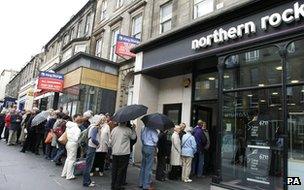How serious is the £2bn Rock loss?
- Published
- comments

The 2007 crisis saw customers queuing to take their money out of Northern Rock.
The National Audit Office's estimate, that the government will ultimately lose £2bn on the privatisation of part of Northern Rock and the winding down of the rest, may sound painful for taxpayers.
But actually it could have been a lot worse.
The government is expected to get back all the cash it put into the bank - some £37bn - and quite a lot more.
What it won't get back, says the NAO, is enough to compensate the public sector either for the risks it ran in saving the troubled mortgage bank or for locking up its money in loans to the Rock for many years.
Think of that loss as the equivalent of what you would lose if you lent money to a friend at a low interest rate rather than getting a higher interest rate by putting that money into a savings account (of course I am assuming you can still find a high-interest account in this world of artificially depressed interest rates, but I think you know what I mean).
For the NAO, that notional £2bn loss is probably a price that was worth paying: it prevented a banking collapse that could have been contagious and could have led to the demise of other banks; also the survival of the Rock maintained the supply of mortgages at a time when other banks were reining in lending.
That said, the NAO points out that in 2010 and 2011 the state-owned Rock supplied fewer mortgages than it promised - £9.1bn of them, or 39% less than the £15bn of its business plan.
All that said, the NAO's criticism of the nationalisation and break-up of the bank is largely restricted to a failure by the then Labour government to fully investigate the financial consequences of breaking up the bank into a so-called good bank and a bad bank.
But even that charge is not too embarrassing for the chancellor of the time, Alastair Darling, because the NAO says the oversight has not led to any significant additional costs for the state.